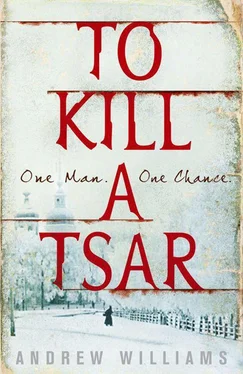She described the basement in the Malaya Sadovaya to them, venturing the opinion that it would be a simple task to drive a gallery beneath the street. Zhelyabov voiced objections, and it was only after an hour of heated wrangling that they reached agreement.
‘So we must try both,’ said Mikhailov. ‘If we manage to detonate the mine there’ll be no need for the bombing party, but with both we can be sure.’
The dvornik was sympathetic, and a picket had been posted in the street, but the committee had met for longer than was wise. Presuming the business to be over, its members began rising stiffly from the floor, stretching aching limbs, brushing dust from their skirts and trousers.
‘I’m sorry, but there’s one thing more.’ There was an ominous note in Mikhailov’s voice. ‘I have been told the prosecutor is going to demand the death sentence.’
No one spoke. No one moved. It was as if Mikhailov had thrown open the windows and a bitter wind had sucked the warmth from the room. Anna turned to Vera Figner and was shocked to find her close to tears, her hand trembling at her mouth.
‘Who are they going to condemn?’ Anna asked tentatively.
‘The city is alive with it, Annushka,’ Sophia replied. ‘They’ve arranged a show trial — Alexander Kviatkovsky, Evgenia and some of the others.’
‘They will try to make an example of Kviatkovsky, and perhaps Presnyakov too,’ Mikhailov added. ‘They found the plan of the palace in Kviatkovsky’s apartment.’
A man Anna did not recognise but from his bearing took to be a junior army officer demanded they attempt a rescue. No one bothered to reply. She took a step towards Vera and tried to put an arm about her shoulders.
Vera shook herself free. ‘No. It’s all right, really,’ but she looked cross, almost hostile, angry that anyone should witness a moment of weakness.
After the meeting broke up, Anna took her friend aside. ‘Evgenia will be all right, Verochka. They won’t execute a woman.’
‘What?’ she asked irritably, the colour rising to her cheeks. ‘You don’t understand, Anna. It’s not my sister…’ She opened her mouth as if ready to say more then she closed it firmly and turned with a scowl to hide her pain.
28 OCTOBER 1880
They told Hadfield not to go. His aunt was concerned it would be too much for him and both Dobson and Colonel Gonne of the embassy were of the view it would be foolish to be seen in court.
‘You will only remind the terrorists of your existence. They might make another attempt on your life,’ Dobson had told him.
‘In court?’
The correspondent had hesitated before suggesting quietly that it would be wise not to show too great an interest in their fate. But Hadfield went anyway.
The gendarmes had thrown a tight cordon round the building on Liteiny Prospekt and were permitting only those with a pass from the Ministry of Justice to enter. Hadfield had twisted Dobson’s arm to arrange one for him, and they had gone together on the third day of the trial. It was a grey morning in late October, with the bitter promise of winter in the air, and both he and Dobson were grateful for the warmth and light of the crowded courtroom. Spare, whitewashed and panelled in dark oak, it was an almost perfect square with three floor-to-ceiling windows before which the judges were seated at a low table. To their left, the prisoners’ dock, to their right, distinguished guests of the court and the gentlemen of the press, and the public were in a gallery of seats opposite. A full-length portrait of the emperor hung in one corner beneath burgundy and gold drapes. The prisoners — sixteen in number — were brought in under guard, and gendarmes in spiked helmets were posted at either end of the dock and at all the doors of the court. The prisoners were dressed smartly in academic black, but their faces were a sickly prison grey, starved of light and nourishment.
Evgenia Figner glanced over to the public gallery from time to time, but although she must have seen him, she was too clever to show it. She sat at the front of the dock with a look of cool defiance that reminded him of Vera, her features thinner and finer than the last time he had seen her, dark hair tidily arranged in a chignon. The defendants were accused of writing and distributing inflammatory propaganda, and Alexander Kviatkovsky and two other men faced the more serious charge of plotting the explosion at the Winter Palace.
‘All sixteen will be convicted,’ Dobson had told him. Apart from Goldenberg’s testimony, read by a clerk with the lugubrious voice of an undertaker, there was plenty of supporting evidence — dynamite, a plan of the palace, false papers and the party’s pamphlets — presented to the court on a table before the judges. At best the defence attorneys were lacklustre, at worse incompetent, as if tacitly acknowledging it to be an open and shut case. From time to time there was mention of those still at liberty — Mikhailov, Zhelyabov, Perovskaya and a woman called Anna Kovalenko.
‘Did you see Special Investigator Dobrshinsky?’ Dobson asked when the court adjourned at lunchtime. ‘He kept glancing over at us. He’s sitting over there, to the right of the judges.’
‘No doubt a satisfied man.’
‘Not until he’s got the lot of them.’
‘He’ll never manage that, George,’ Hadfield replied with a weak smile, ‘not until Russia changes. Have you read the latest reports of famine in the south?’
Dobson’s face crumpled into a pained expression. ‘You may be right but really, is it sensible to say so here?’
When the proceedings resumed, Hadfield looked and found the special investigator seated beneath his imperial master, his face as drawn and grey as the prisoners’. He was careful to avoid catching his eye. The afternoon began with a fiery speech from Alexander Kviatkovsky justifying the party’s ‘red terror’ as the only course open to those who believed in democracy and socialism. He was from a good family, he spoke well, and Hadfield was stirred by his passion and conviction but struck too by the futile waste of a young man who would almost certainly lose his life on the scaffold. As for the others, they would be sentenced to penal servitude for life for talking and writing of democracy, calling for the overthrow of a despot. Their heads would be shaven, they would be marched from the St Peter and St Paul Fortress to the station, and from there to Kara in the frozen east. And in time, he knew, this would happen to Anna too.
‘All rise.’
The tinkle of a hand bell signalled the end of the court day. The judges were escorted from the room followed by the accused, almost lost within a phalanx of sky-blue uniforms. As the last was leaving, the special investigator slipped between chairs and walked across the courtroom towards him.
‘I’m glad you’ve recovered from your injuries in time to see justice done, Doctor.’
Hadfield acknowledged him with a curt nod.
‘Mr Dobson.’ Dobrshinsky offered the correspondent his hand. ‘I hope you’re taking precautions,’ he said, turning to Hadfield again. ‘I can’t rule out the possibility of another attempt on your life.’
‘I’m careful,’ Hadfield replied quietly.
‘A terrible shock, really. You heard, I’m sure: the student was sentenced to twenty years. We’re still searching for his accomplices.’ Dobrshinsky paused then added, ‘and Anna Kovalenko, of course.’
Hadfield leant forward a little to peer at him with scientific interest, a frown of concentration between his eyes.
‘You’ll be relieved to learn that our sources suggest she is in Kiev,’ said Dobrshinsky. ‘You may be safe for a little longer.’
Читать дальше












